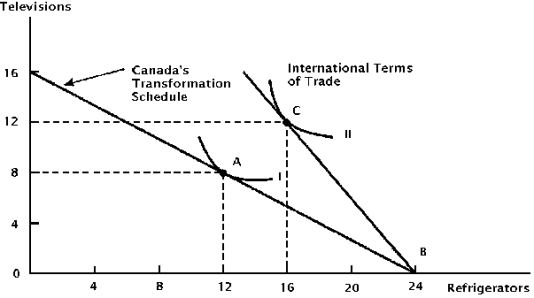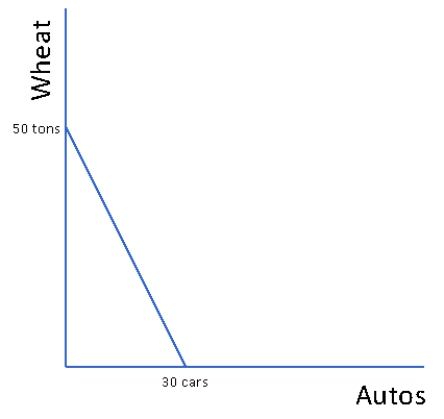Exam 2: Foundations of Modern Trade Theory: Comparative Advantage
Exam 1: The International Economy and Globalization48 Questions
Exam 2: Foundations of Modern Trade Theory: Comparative Advantage170 Questions
Exam 3: Sources of Comparative Advantage109 Questions
Exam 4: Tariffs124 Questions
Exam 5: Nontariff Trade Barriers133 Questions
Exam 6: Trade Regulations and Industrial Policies129 Questions
Exam 7: Trade Policies for the Developing Nations100 Questions
Exam 8: Regional Trading Arrangements130 Questions
Exam 9: International Factor Movements and Multinational Enterprises96 Questions
Exam 10: The Balance of Payments99 Questions
Exam 11: Foreign Exchange121 Questions
Exam 12: Exchange-Rate Determination133 Questions
Exam 13: Mechanisms of International Adjustment107 Questions
Exam 14: Exchange-Rate Adjustments and the Balance of Payments100 Questions
Exam 15: Exchange-Rate Systems and Currency Crises107 Questions
Exam 16: Macroeconomic Policy in an Open Economy72 Questions
Exam 17: International Banking: Reserves, Debt, and Risk96 Questions
Select questions type
Unlike Adam Smith, David Ricardo's trading principle emphasizes the:
(Multiple Choice)
4.9/5  (43)
(43)
If a country's terms of trade worsen, it must exchange fewer exports for a given amount of imports.
(True/False)
4.9/5  (42)
(42)
Table 2.1. Output Possibilities of the U.S. and the U.K.
Caunty Tons of Steel Televisians United States 5 45 United Kingdom 5 20
-Refer to Table 2.1. Mutually advantageous trade will occur between the United States and the United Kingdom so long as one ton of steel trades for:
(Multiple Choice)
4.9/5  (43)
(43)
The theory of reciprocal demand best applies when one country has a "large" economy and the other country has a "small" economy.
(True/False)
4.9/5  (40)
(40)
If the international terms of trade lies beneath (inside) the Mexican cost ratio, Mexico is worse off with trade than without trade.
(True/False)
4.7/5  (36)
(36)
Because the Ricardian theory of comparative advantage was based only on a nation's demand conditions, it could not fully explain the distribution of the gains from trade among trading partners.
(True/False)
4.7/5  (35)
(35)
The trading-triangle concept is used to indicate a nation's:
(Multiple Choice)
4.7/5  (37)
(37)
The Ricardian model of comparative advantage is based on all of the following assumptions
(Multiple Choice)
4.8/5  (38)
(38)
The domestic cost ratios of nations set the outer limits to the equilibrium terms of trade.
(True/False)
4.9/5  (45)
(45)
Ricardo's theory of comparative advantage does not take into account demand conditions when determining relative commodity prices.
(True/False)
4.8/5  (40)
(40)
The price-specie-flow mechanism illustrated why nations could not maintain trade surpluses or trade deficits over the long run.
(True/False)
4.9/5  (33)
(33)
Assume that Canada has a comparative advantage in wheat and a comparative disadvantage in autos. As the Canadian demand for wheat increases, Canada's equilibrium terms of trade improves.
(True/False)
5.0/5  (44)
(44)
Figure 2.2 illustrates trade data for Canada. The figure assumes that Canada attains international trade equilibrium at point
Figure 2.2. Canadian Trade Possibilities
 -According to Figure 2.2, for Canada total:
-According to Figure 2.2, for Canada total:
(Multiple Choice)
4.8/5  (38)
(38)
According to the principle of absolute advantage, international trade is beneficial to the world if one nation has an absolute cost advantage in the production of one good while the other nation has an absolute cost advantage in the other good.
(True/False)
4.8/5  (35)
(35)
Assume that Germany has higher labor productivity and higher wage levels than France. Germany can produce a commodity more cheaply than France if its productivity differential more than offsets its wage differential.
(True/False)
4.8/5  (37)
(37)
Figure 2.4 Production Possibilities Frontier
 -In Figure 2.4 the marginal rate of transformation of autos into wheat is
-In Figure 2.4 the marginal rate of transformation of autos into wheat is
(Multiple Choice)
4.8/5  (44)
(44)
The Ricardian theory of comparative advantage could fully explain the distribution of the gains from trade among trading partners.
(True/False)
4.8/5  (38)
(38)
Showing 141 - 160 of 170
Filters
- Essay(0)
- Multiple Choice(0)
- Short Answer(0)
- True False(0)
- Matching(0)